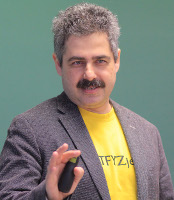Scope
WABI is an international Conference covering research in algorithmic work in bioinformatics, computational biology and systems biology. The emphasis is mainly on discrete algorithms and machine learning methods that address important problems in molecular biology, that are founded on sound models, that are computationally efficient, and that provide evidence of their potential usefulness in practice, preferably by testing on appropriately chosen simulated or real datasets. The goal is to present recent research results, including significant work-in-progress, and to identify and explore directions of future research. This year it is co-located with ALGO 2024.
Important Dates
Paper submission deadline: May 26 (Anywhere on Earth)Notifications: June 30Camera-ready versions: July 08Invitations to authors of selected papers for the WABI 2024 series in Algorithms for Molecular Biology (AMB): July 22- Conference: Sep 2 – Sep 4
- Extended paper submission deadline (AMB): Oct 31
Keynote Speaker

Tomás Vinar, Comenius University
Title: Bioinformatics of Pathogens
Abstract: Genomic sequencing has become an important tool in identification and surveillance of human pathogens. Compared to large organisms, where our goal is to obtain high-quality sequences for detailed analysis, in pathogen sequencing the emphasis is often on optimization of cost and time. Consequently, sequencing of pathogens creates interesting computational challenges and development of new methods has a potential to significantly enhance applicability of the results in epidemiology and clinical practice. In my talk, I will give two examples: plasmid identification in bacterial isolates and genomic surveillance of wastewater for SARS-CoV-2. In both cases, application of better algorithms and modeling helps to improve the quality of analysis of very noisy data.
Invited Speaker

Giulia Bernardini, University of Trieste
Title: Solving phylogenetic problems through graph theory: two case studies
Abstract: In this talk, I will showcase two problems arising in Phylogenetics that get efficient solutions via reductions to well-studied problems on bipartite graphs. First, I will introduce the incomplete directed perfect phylogeny problem, asking to complete missing entries in a species-characters binary matrix so as to reconstruct a directed perfect phylogeny. I will demonstrate how this problem can be solved in linear time by designing a specialized dynamic connectivity data structure on bipartite graphs. The second problem asks to compute the permutation distance between two isomorphic, fully labelled phylogenetic trees. I will show how this task can be reduced to computing the largest cardinality matching in a sparse bipartite graph to obtain an efficient solution.
Schedule
The full WABI 2024 schedule can be found here.
Call for Papers
Submissions must be formatted in LaTeX using the LIPIcs style and must not exceed 15 pages excluding references, the front page (authors, affiliation, keywords, abstract, etc.) and a brief appendix (of up to 5 pages). For details please see the information for authors. Each paper must contain a succinct statement of the issues and of their motivation, a summary of the main results, and a brief explanation of their significance, all accessible to non-specialist readers. All submissions must be made online, through the EasyChair submission system.
For scientific information, please contact one of the WABI program committee co-chairs, Solon P. Pissis (solon.pissis[at]cwi[dot]nl) or Wing-Kin Sung (kwksung[at]cuhk[dot]edu[dot]hk). For organizational information, please refer to the ALGO 2024 website.
You will need to register on the EasyChair web site before submitting. A standard .pdf file must be received by May 26, 2024 (Anywhere on Earth) in order for your submission to be considered. Simultaneous submission to another conference with published proceedings is not permitted, but simultaneous submission to a journal is allowed, provided that the authors notify the program chairs; if published in a journal, such a contribution will be published as a short abstract in the WABI proceedings. Depositing in arxiv.org or biorxiv.org is allowed.
By submitting a paper, the authors of the paper acknowledge that in case of acceptance at least one of them must register at ALGO 2024, attend the conference physically, and present the paper.
Accepted papers will be published in the WABI proceedings in the LIPIcs Leibniz International Proceedings in Informatics.
Selected papers will be invited for an extended publication in a thematic series in Algorithms for Molecular Biology (AMB).
Accepted Papers
- Luis Cunha, Ignasi Sau and Uéverton Souza. On the Complexity of the Median and Closest Permutation Problems
- Yao-Ban Chan. An efficient algorithm for the reconciliation of a gene network and species tree
- Stephen Hwang, Nathaniel K. Brown, Omar Y. Ahmed, Katharine Jenike, Sam Kovaka, Michael C. Schatz and Ben Langmead. MEM-based pangenome indexing for k-mer queries
- Lukas Hübner and Alexandros Stamatakis. Memoization on Shared Subtrees Accelerates Computations on Genealogical Forests
- Mahmudur Rahman Hera and David Koslicki. Cosine Similarity Estimation Using FracMinHash: Theoretical Analysis, Safety Conditions, and Implementation
- Yuanyuan Qi and Mohammed El-Kebir. Sapling: Inferring and Summarizing Tumor Phylogenies from Bulk Data using Backbone Trees
- Sebastian Schmidt, Santeri Toivonen, Paul Medvedev and Alexandru I. Tomescu. Applying the safe-and-complete framework to practical genome assembly
- Tsuyoshi Urata, Manato Yokoyama and Momoko Hayamizu. Orientability of undirected phylogenetic networks to a desired class: Practical algorithms and application to tree-child orientation
- Lore Depuydt, Luca Renders, Simon Van de Vyver, Lennart Veys, Travis Gagie and Jan Fostier. b-move: faster bidirectional character extensions in a run-length compressed index
- Giulio Ermanno Pibiri and Ragnar Groot Koerkamp. The mod-minimizer: a simple and efficient sampling algorithm for long k-mers
- Leonard Bohnenkämper, Jens Stoye and Daniel Dörr. Reconstructing Rearrangement Phylogenies of Natural Genomes
- Md. Hasin Abrar and Paul Medvedev. PLA-index: A k-mer Index Exploiting Rank Curve Linearity
- Rocco Ascone, Giulia Bernardini, Alessio Conte, Massimo Equi, Esteban Gabory, Roberto Grossi and Nadia Pisanti. A unifying taxonomy of pattern matching in degenerate strings and founder graphs
- Jens Zentgraf and Sven Rahmann. Swiftly identifying strongly unique k-mers
- Bertrand Marchand, Nadia Tahiri, Olivier Tremblay-Savard and Manuel Lafond. Finding Maximum Common Contractions Between Phylogenetic Networks
- Ragnar Groot Koerkamp. A*PA2: Up to 19× faster exact global alignment
- Kimon Boehmer, Sarah Juliane Berkemer, Sebastian Will and Yann Ponty. RNA Triplet Repeats: Improved Algorithms for Structure Prediction and Interactions
- Théo Boury, Laurent Bulteau and Yann Ponty. RNA inverse folding can be solved in linear time for structures without isolated stacks or base pairs
- Alitzel López Sánchez, José Antonio Ramírez-Rafael, Alejandro Flores-Lamas, Maribel Hernández-Rosales and Manuel Lafond. The Path-Label Reconciliation (PLR) Dissimilarity Measure for Gene Trees
- Giovanni Buzzega, Alessio Conte, Roberto Grossi and Giulia Punzi. McDag: Indexing Maximal Common Subsequences in Practice
- Xiaofei Carl Zang, Xiang Li, Kyle Metcalfe, Tuval Ben Yehezkel, Ryan Kelley and Mingfu Shao. Anchorage accurately assembles anchor-flanked synthetic long reads
- Adam Cicherski, Anna Lisiecka and Norbert Dojer. AlfaPang: alignment free algorithm for pangenome graph construction
WABI Program Committee
PC Chairs
Solon P. Pissis, CWI, Netherlands
Wing-Kin Sung, Chinese University of Hong Kong, Hong Kong
PC Members
Tatsuya Akutsu, Kyoto University
Jarno Alanko, University of Helsinki
Lorraine Ayad, Brunel University London
Jasmijn Baaijens, TU Delft
Giulia Bernardini, Università di Trieste
Broňa Brejová, Comenius University in Bratislava
Panagiotis Charalampopoulos, Birkbeck, University of London
Rayan Chikhi, CNRS
Lenore Cowen, Tufts University
Manuel Cáceres, Aalto University
Daniel Doerr, Heinrich Heine University Düsseldorf
Mohammed El-Kebir, University of Illinois at Urbana-Champaign
Jonas Ellert, École Normale Supérieure Paris
Anna Gambin, University of Warsaw
Shilpa Garg, Technical University of Denmark
Bjarni Halldorsson, deCODE genetics and Reykjavik University
Wing-Kai Hon, National Tsing Hua University
Carl Kingsford, Carnegie Mellon University
Gregory Kucherov, CNRS/LIGM
Dominik Köppl, University of Yamanashi
Manuel Lafond, Université de Sherbrooke
Francesca Nadalin, EMBL
Yuri Pirola, Univ. degli Studi di Milano-Bicocca
Nicola Prezza, Ca’ Foscari University
Mingfu Shao, The Pennsylvania State University
Sharma V. Thankachan, North Carolina State University
Prudence Wong, University of Liverpool
Simone Zaccaria, UCL Cancer Institute
Meirav Zehavi, Ben-Gurion University
Jie Zheng, ShanghaiTech University